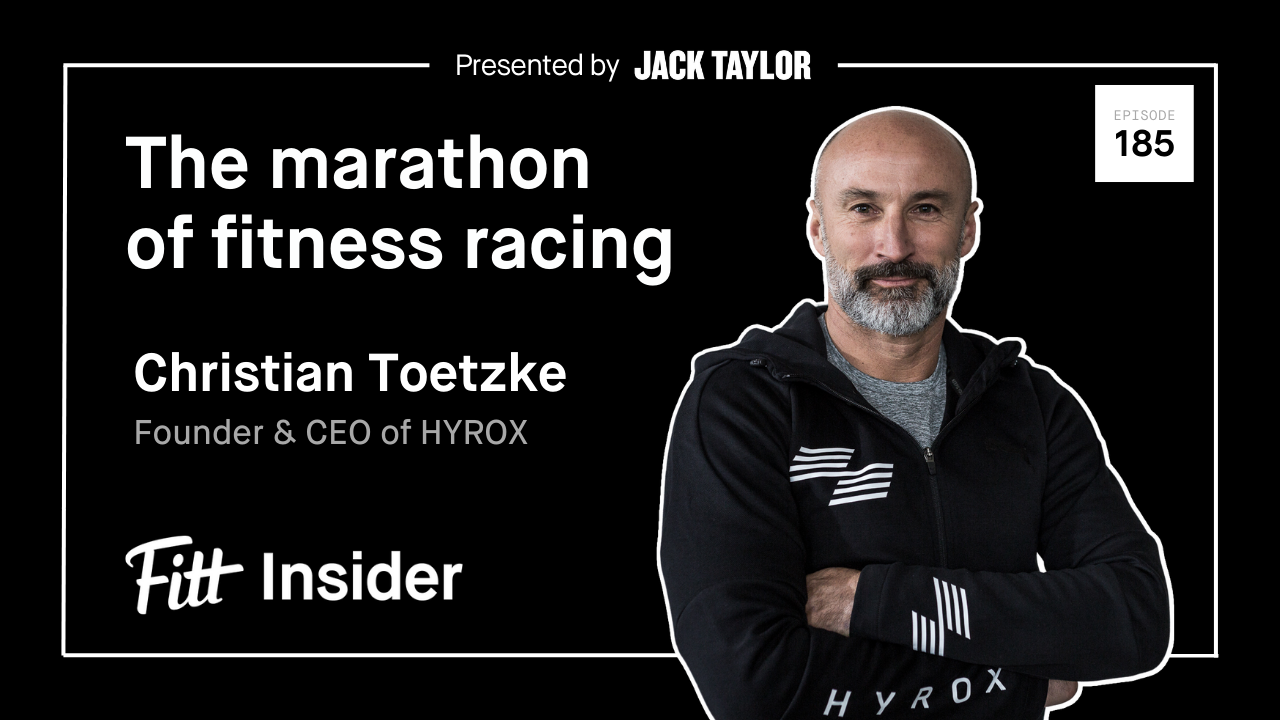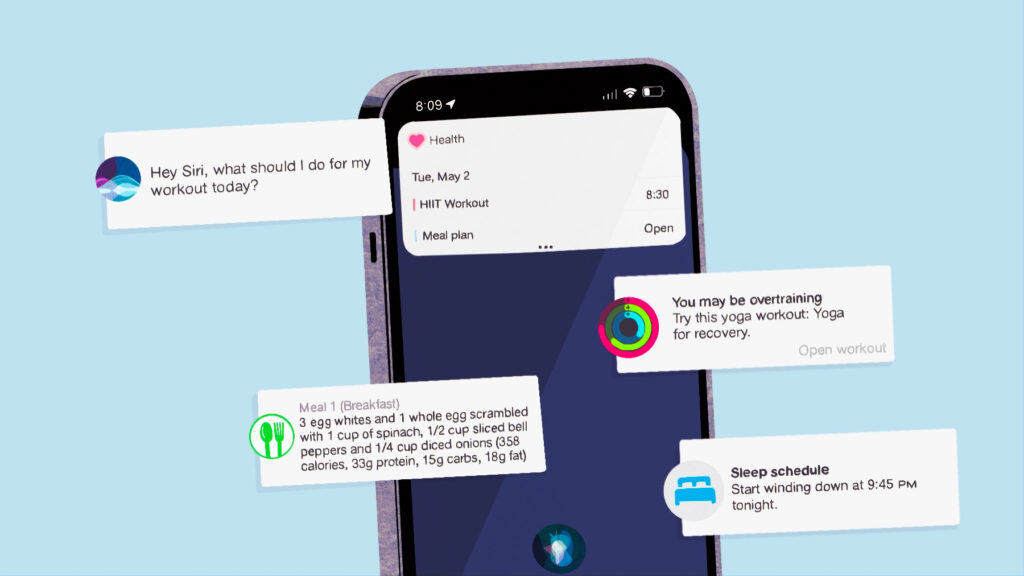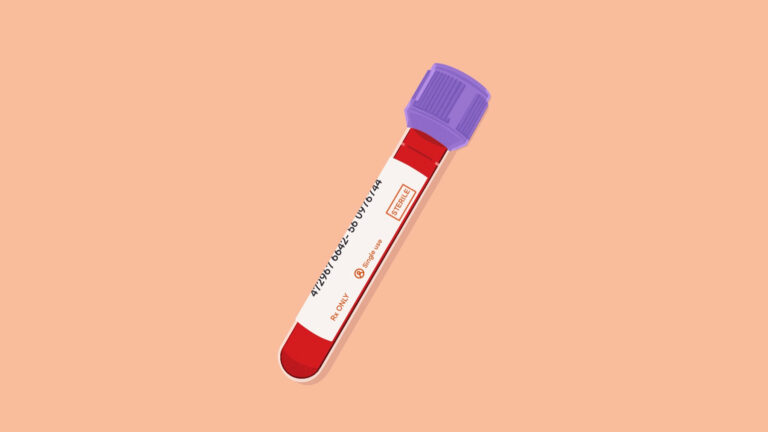As AI accelerates, Apple wants to put a health coach in your pocket.
Coach+
Leveraging AI and health data, Apple is working on a service—codenamed Quartz—to offer personalized programs for fitness, nutrition, and sleep.
Nothing new, the company’s health and wellness efforts have ramped up in recent years. But now, as AI hype builds, Apple is flexing the power of its platform.
More than its smartwatch, Apple Health aggregates data from other applications and devices, creating a comprehensive view of overall health.
Training AI to provide hyper-personalized coaching, the company could deliver actionable guidance beyond gamified activity rings or “Time to Stand” reminders.
Of note, like Apple’s workout membership Fitness+, the rumored health coach would be a standalone app and subscription, enhancing its ecosystem and services revenue.
A work in progress, Quartz is slated to launch next year but could still be scrapped.
One of One
While Apple plots its next move, AI-generated workouts and meal plans are becoming commonplace.
- Fitness: Routines based on available equipment, weight lifted, and reps performed; devices use sensors/computer vision to guide form, intensity, and load.
- Nutrition: Dietary guidance and supplementation based on blood tests, wearable data, and glucose monitoring for real-time feedback.
- Sleep: Devices and “coaching” to optimize energy levels, circadian rhythm, and duration/quality.
Entering new categories, AI powers TrainerRoad’s cycling plans, SnapCalorie’s photo-based nutritionist, Wysa’s mental health coach, and Tally’s longevity platform.
Meanwhile, health trackers like Oura, WHOOP, and Withings are niching down to outmaneuver Apple. More than data, WHOOP bills itself as a “personalized coach,” while Withings+ offers coaching based on a suite of devices.
But, as AI becomes table stakes, personalization will take on new forms.
Health x AI
A sign of things to come, rumors of Apple’s coaching service signal the potential of AI health models built “for you.”
10x trainers. AI isn’t replacing humans; it’s making trainers, nutritionists, and health coaches more effective. Leveraging tech to optimize programming and track progress, real-life coaches provide motivation, expertise, and accountability to foster behavior change.
To that point, on the Fitt Insider Podcast, Fitbod CEO Allen Chen said, “I don’t believe we could ever replace human personal trainers — that’s not our intention.” He insisted companies like his can use AI to empower health and fitness professionals.
HealthGPT. Countless apps collect, analyze, and visualize health data, but interpreting and implementing insights poses a challenge. Enter: AI health assistants.
Linking Apple Health to ChatGPT, it’s already possible to have a conversation with your health data, gleaning tailored advice and coaching. Soon, combining wearables, lab tests, and family health history with a chat-like interface, AI assistants will play a key role in lifestyle intervention, disease management, and more.
“Hey, Coach+.” Circling back to Apple’s AI coach, imagine simply asking Siri to audit your diet or workout plan if progress stalls, then telling your “coach” to adjust your program in real time.
But, more than activity data, as the company’s health ecosystem expands, the AI coach could automatically incorporate gait analysis, blood pressure, glucose levels, and medications to proactively improve well-being.
Looking ahead: As AI innovation continues at breakneck speed, concerns over privacy, bias and inequity, and risk of potential harm must be addressed. But, as we gain deeper insight into our body’s unique needs, we’re moving closer toward the personalized, preventative future of healthcare.
🎙 On the Podcast

HYROX founder & CEO Christian Toetzke discusses the global rise of fitness racing.
We also cover: its growing affiliate gym network and creating a mass-participation event.
Listen to today’s episode here
📉 Amazon shutters Halo wearables division
The tech giant scrapped its Halo Band and Halo View wearables, along with bedside sleep tracker Halo Rise.
In doing so, the company laid off the entire division’s staff.
Failure to launch. Ramping up in recent years, Amazon’s connected health effort targeted consumer wellness, with the potential to extend into healthcare.
- Aug. 2020: Launched its first wearable, Halo Band
- May 2021: Debuted Movement Health, an AI-assisted MSK feature developed with Dr. Kelly Starrett
- Sept. 2021: Unveiled platforms for digital fitness and nutrition, as well as second-gen wearable Halo View
- Sept. 2022: Released Halo Rise, a bedside sleep tracker
Of note, Amazon Halo was also an element of the company’s ill-fated B2B virtual care service, Amazon Care.
Look-alike. As WHOOP CEO Will Ahmed alleged—and we detailed in Issue No. 094—Halo Band looked and functioned a lot like WHOOP’s signature product.
In response, WHOOP etched the phrase “Don’t bother copying us, we will win” into every new circuit board of its 4.0 strap.
When word of Halo’s demise broke, Ahmed took a victory lap, encouraging others to “ignore competition” and “just keep going.”
Punchline: Although Amazon is exiting hardware (for now), after acquiring One Medical, the company is still squarely in the healthcare race. Meanwhile, wearable makers still have to contend with Apple as the wrist wars continue.
🆕 InsideTracker adds women-focused longevity testing
The company aims to help female users increase healthspan and navigate menopause.
What’s new: Enhancing its platform, InsideTracker added three female-focused biomarkers to its analysis: estradiol, progesterone, and thyroid-stimulating hormone (TSH).
Implementing the additional data points, the company will deliver more-complete insights and recommendations for female users’ health through all stages of life, including before and after menopause.
Mind the gap. According to InsideTracker VP of science Dr. Renée Deehan, because women encounter numerous barriers across healthcare, it’s important to democratize access with at-home solutions:
“Sex and gender inequity in healthcare is real, and we are committed to doing what we can to close that gap. We want to arm [women] with the knowledge and education needed to understand their own unique biology.”
Her health. Still, women remain underrepresented across scientific research and wellness products. But more brands are bridging the gap, paying close attention to hormone health, longevity, and performance.
- Wild.AI syncs with wearables to help womxn track, train, eat, and recover.
- Evernow and Elektra Health are building digital menopause care platforms.
- Eli Health just raised $5M to scale its saliva-based at-home hormone test.
Looking ahead: From personalized care to wearables and epigenetic age clocks, startups will need to revisit their algorithms, ensuring women have adequate information to guide their health journeys.
🤝 Be a friend, tell a friend

Want to get your hands on some exclusive Fitt Insider gear?
All you have to do is share your custom link and collect rewards when friends subscribe to the Fitt Insider newsletter.
Check out the full list of rewards and get started here.
📰 News & Notes
- Fitness mirror maker FORME goes public.
- FDA approves bacteria-filled microbiome pill.
- Athletic Brewing takes to the skies with JetBlue.
- Masimo v. Apple Watch patent suit ends in mistrial.
- OLIPOP doubles sales, turns down takeover from Big Bev.
- Fitt Jobs: Take the next step on our curated careers page.
- PVOLVE updates brand, prepares for franchise expansion.
- Nautilus sells its namesake trademark as “non-core asset.”
- Tia adds women’s support groups, mental wellness coaching.
- CrossFit cuts 20% of workforce, transitions Precision Care to Wild Health.
- Startup Q&A: Ommyx CEO David Mehlman on unlocking siloed health data.
💰 Money Moves
- Practice Better, a Canadian business management platform for health and wellness professionals, raised $27M in a funding round led by Five Elms Capital.
More from Fitt Insider: The Everything Coach - Fertility care platform Kindbody raised $25M in funding from Morgan Health, the healthcare venture arm of JPMorgan Chase.
- Thesis, a nootropic supplement maker, closed a $8.4M Series A round from Unilever Ventures, NBA star Kevin Love, and others.
- Pickleball operator The Pickleball Club secured two properties in Florida to develop its sixth and seventh indoor facilities.
More from Fitt Insider: Game On - Uwill, a mental health platform for college students, raised $30M in a Series A round.
- TympaHealth, a London-based hearing health startup, added $23M in a Series A round led by Octopus Ventures.
- Enterprise movement health platform Sparta Science raised an undisclosed funding round led by IA Capital.
More from Fitt Insider: The Business of Movement Health - PsyMed Ventures, a mental health tech VC, reached $15M in signed commitments for its fund.
- Beauty company Oddity acquired Revela, an AI-driven R&D company for beauty products, for $76M.
- FitLife Brands, maker of nutritional supplements, landed $16M from First Citizens Bank.
- Swiss AI-enabled longevity platform Biolytica raised CHF 5.25M ($5.8M) in a funding round.
More from WellToDo: Longevity Clinics Land in Europe - Canadian plant-based food manufacturer Above Food will go public through a SPAC merger with Bite Acquisition Corp.
- Sourse, makers of supplement-fortified chocolates for beauty and wellness, added $2.4M in a seed round.
- An unnamed group of British investors acquired aila, maker of clean-label pre-workout supplements.
Today’s newsletter was brought to you by Anthony Vennare, Joe Vennare, and Ryan Deer.






